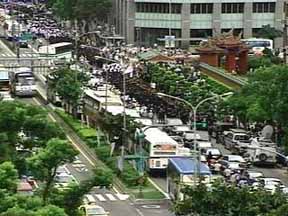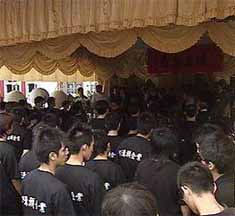![]()
The Ultimate Arbitrator
Who is the ultimate arbitrator in Taiwan? Whose word is final and accepted by everybody? None of the past or present presidents of Taiwan qualify because second-guessing and automatic contrarianism comes with that position. The ultimate arbitrator was the man known as Brother Mosquito (蚊哥).
Brother MosquitoOn May 29, memorial services were held for the late Brother Mosquito. More than 10,000 men in black pants, black/white shirts and shades were there.


Brother Mosquito was born in 1913. He started working in a market as a young man and he joined the Central Market gang. He was small and skinny, but he was quick and tough like a mosquito. That was how he came to get the nickname Brother Mosquito. Later on, he began to run restaurants in the Hsimending area as well as grocery stores.
When the Kuomintang government took over Taiwan after the Second World War, Brother Mosquito was elected as a Taipei City Council member in the first elections. Through his political and underworld connections, he became the Godfather of the underworld and the ultimate arbitrator. He was the conduit through which the government communicated with the underworld; he was the mediator when there were conflicts between gangs.
On April 6, he was eating sushi and choked to death. For his memorial services, the committee included the leaders from the Bamboo United, the Pine United, the Four Seas and the Tiendaomeng gang syndicates. It was a measure of the respect for Brother Mosquito that rival gang leaders would serve on the same committee. The gang leaders even held a joint press conference and got their photographs taken. At the press conference, the committee declared that May 29th would be a Day of Peace on which inter-gang rivalries will be put aside. Due to the large number of attendees from different organizations, the gangs assembled in the public park close to the hall. Once their numbers have arrived, they were given their uniforms. The gangs from the north wore black shirts and pants, with the names of their organizations on the back; the gangs from the south wore white shirts and black pants, with the names of their organization in the back.
The configuration of these gang syndicates actually illuminates on the social division in Taiwan. The Bamboo United, the Pine United and the Four Seas gang are the children of mainlanders. The Tiendaomeng is an alliance forged from Taiwanese gangs whose strengths were in the food markets and transportation industries.
It is interesting to note that the Tiandaomeng was formed as an unintended consequence of a government effort to stem the underworld gangs as a whole. In the 1980's, there was a series of underworld actions from Taiwan that had major international repercussions. The most devastating one for the government was the disclosure that members of the Bamboo United gang had gone to the United States to assassinate a Chinese-American writer at the behest of the Taiwan military intelligence. In 1984, the government ran a massive sweep (known as the Yi-Ching case (一清專案)) of thousands of underworld gangsters and shipped them off to Green Island for educational reform (note: there were four similar major operations: 1962, 1968, 1986 and 1996).
When the thousands of gangsters appeared on Green Island, the Bamboo United accounted for one-third of the total. They had the numbers, they were better organized and they oppressed the smaller gangs, especially the Taiwanese gangs. The smaller Taiwanese gangs needed to protect themselves, so they formed the alliance known as Tiendaomeng. Immediately, the alliance became the largest gang syndicate in Taiwan. This is an alliance in the sense that the local ganglords still ruled in their own turfs, but they coordinated their activities on collective issues.
There are other unintended consequences of the Yi-Ching case (see Liberty Times). For one thing, some of those who were thrown into jail were not hardcore gang members and spending time in that environment guaranteed that they received the proper training, indoctrination and networking to become hardcore gang members. For another thing, putting a bunch of gang leaders together in one place allowed them to forge alliances and hatch new ideas to implement when they got out after a year or two. A third important consequence was that elected legislators enjoy immunity from prosecution, so it encouraged gangsters to run for public office.
At memorial services, it is customary to leave a sum of money as a sign of respect. Upon information, the largest amount came from the leader of the Noguchi-gumi of the Sumiyosi yakuza gang in Japan to the sum of 500,000 NT dollars. The money was offered in two large packages and took a long time for the reception staff to count. Brother Mosquito's daughter-in-law also gave 500,000 NT dollars in the name of her Xiamen gang. The Bamboo United leader and the spiritual leader of Tiendaomeng each gave 500,000 NT dollars. Even the notorious shooter Yang Shiangwu (楊雙伍) (note: he shot the leader of the Four Seas gang, among others) gave 500,000 NT dollars. The total amount taken is estimated to be more than 10 million NT dollars.
Noguchi-gumi leader arrives in TaiwanAll of this sounds romantic and chivalrous. Unfortunately, there are major costs to society from underworld activities such as protection rackets, kidnapping for ransom, illegal gambling, drug dealing, professional hits, robberies, price fixing, prostitution, influence peddling, smuggling, etc. You can go into a restaurant and eat a meal. Why does it cost what it costs? How much of the bill goes to pay for protection?
Why do gangsters continue to function? There is no political will to stop them, because they are embedded in the system by being great at getting out the vote, immensely generous with campaign donations and highly effective in delivering results through extra-legal means. This is a subject that the people of Taiwan will pretend that they don't know about in their democratic system.